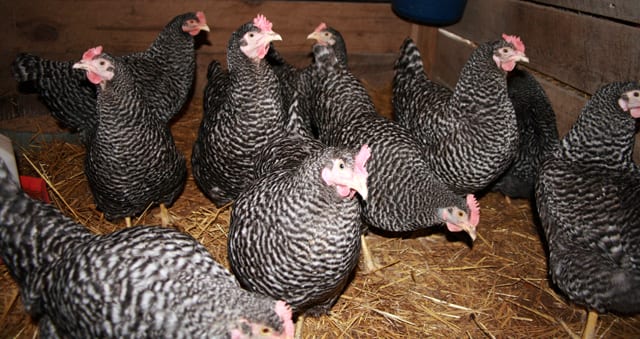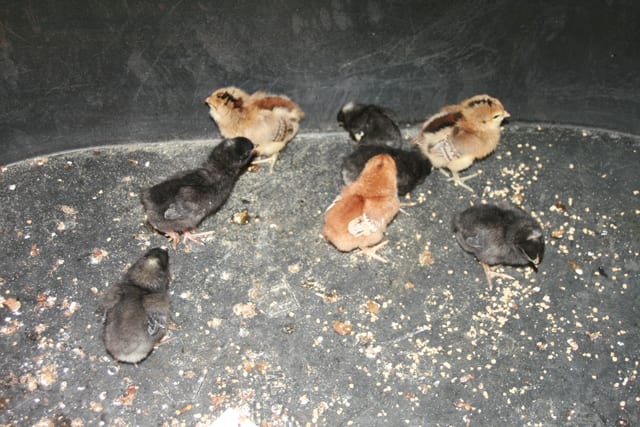Should Chickens Be Your Next Pet?

When I first started with chickens, I’ll admit I was a bit overwhelmed with the number of breeds. What color eggs did I want; white, brown, green? Wait, there’s green eggs? Yes, there’s a chicken for that! And, just how many eggs do they lay, anyway? And, wait a second! Some chickens are more aggressive than others? But, hold on…keeping chickens really is not that complicated!

Before you commit to purchasing chickens, there are several considerations you should think about:
[list type=”pointerlist2″]
- Like with any other pet, who’s going to take care of the chickens? Is this a ‘family effort,’ where everyone shares in the feeding, watering, and care? Or mainly one person’s responsibility?
- What about zoning regulations, or neighborhood restrictions?
- Do you have adequate housing? Chickens do not require a lot of space but do need shelter from wind and harsh weather, and it doesn’t need to be fancy. You’ll need a feeder, waterer, nest boxes, and perches for roosting.
- If you don’t have a fence, you’ll want to consider putting one up. A good fence will keep dogs and other predators away from your chickens, and keeps the chickens from wandering into your neighbor’s yard.
- Let your neighbors in on what you’re doing. Keep in mind that roosters crow, and sometimes they crow at times other than in the morning. You do not need a rooster for egg laying, however, so that may not be a concern. Hens do “sound the alarm” after laying an egg, but usually it’s just a few cackles and not bothersome. However, there are persnickety neighbors out there, so you may want to forewarn them.
Something you’ll want to determine early on is exactly what do you hope to accomplish with having chickens? Are they simply going to wander your yard, eating bugs, and generally being a family pet? Do you want to enjoy fresh, organic eggs? Or, do you want to raise chickens primarily for their meat? Maybe you’re unsure and want both eggs and meat? By identifying what you’re wanting to do, identifying a breed that’s right for you will be that much easier.
Once you’ve determine the purpose of your chickens, research different breeds to determine which fits your needs. Some popular egg breeds include Anconas, Leghorns, or Minorca. Popular meat breeds include Australorps, Cornish, and Orpington. Dual-purpose breeds include New Hampshire, Plymouth Rocks, and Rhode Island Reds. Some chickens are more aggressive than others; this may be a consideration if you have small kids that will want to help take care of them. Some chickens lay colored eggs; my Americaunas lay pastel green eggs, and Marans lay chocolate brown eggs. This makes for great novelty but the inside of the egg is the same as a ‘normal’ egg (though there seems to be a lot of back-and-forth on if they contain less/more cholesterol).
Now, where do you get chickens, anyway? Actually it’s a bit easier than you might expect. There are a number of options:
[list type=”pointerlist2″]
- Local feed & seed mills usually get shipments of chicks and ducklings in early spring/spring…usually when it warms up a bit. My favorite place is Harvest Feed & Seed in Harvest. I’ve found they have great prices, and their chicks are about the healthiest I’ve found. Other places are Garvin’s and Tractor Supply. The feed mills will usually have the chicks sexed (or only have females) but you take your chances at Tractor Supply. I also like the benefit only getting a small number of chicks…but you may be limited in the breed options as well.
- Mail order/online – there are countless options for ordering chicks online. Similarly, you’ll find a much broader range of breed options…however, the supplier may require a minimum order of 10-15 chicks. And, not to sound like a plug for Harvest Feed & Seed, I have called them in the past and told them I only wanted a certain number of Plymouth Rocks and they were able to order them for me, at a lower price than I could find online.
- You can find a local seller such as a farmer or at the flea markets; you don’t have to get chicks and raise them…you can buy adult chickens but I urge caution if you go this route. Know that chickens are easily stressed, and the move can cause them to stop laying for a short period. Too, you do not know what sicknesses they may be carrying – this is especially a concern if you’re introducing them into an existing flock. Plus, don’t make the mistake I did of buying a bunch of chicks, then finding out later on it was a bunch of roosters!

Chickens will typically begin laying eggs around 20-24 weeks of age. One thing I’ve learned from experience is that chickens DO lay in the winter, despite reading to the contrary. My chickens happened to start in the fall…by Christmas I was getting 10-12 eggs per day from a flock of 10. You can imagine the batches of eggnog I forced my family to test!
If you are interested in learning more about having your own backyard flock, I can heartily recommend Barnyard in Your Backyard: A Beginner’s Guide to Raising Chickens, Ducks, Geese, Rabbits, Goats, Sheep, and Cattle edited by Gail Damerow. Or, feel free to send me any questions you may have and I’ll do my best to answer them based on my experience of raising chickens. It’s been a rewarding and educational experience, and I love to share what I’ve learned!
Photo Credit:One Tree Photography (chicken coop); Misty Ridge Stables (chickens, chicks)
Although Stacy De Smet grew up on a dairy farm in south-central Pennsylvania, she never anticipated becoming a farmer herself, but that's exactly what happened when she and her family moved to a small farm in Taft, TN, in November of 2005. Over the years they have turned Misty Ridge Stables into a thriving family farm. In addition to boarding horses and running a local CSA, they also offer classes in canning, gardening and many other farm related topics.





